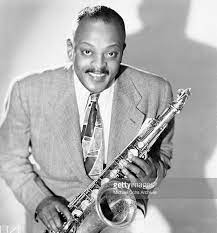
Today is Ben Webster’s 104th birthday anniversary. Webster came to fame with Duke Ellington, but the tenor saxophone was a later addition to Duke’s tonal palette as trumpets, trombones, clarinets, alto and baritone saxes predominated in the first 15 years of his orchestra’s life. But Ellington famously wrote more for players than for instruments, so while the tenor gained prominence in the 20’s and ’30’s through the work of Coleman Hawkins, Bud Freeman, Chu Berry and Lester Young, it wasn’t until 1939, when he hired Webster, that Duke found the right match between sound and stylist.

As Ellington timelines go, Webster’s tenure was fairly brief, 1939-‘43. But his impact, like his sound, was huge. Webster was featured on numerous Ellington masterworks of the early ‘40s, including “Conga Brava,” “Sepia Panorama,” “All Too Soon,” and “Cottontail.” And while he left Duke to work in small group settings on 52nd Street in the mid-40’s, he cast a long shadow over Ellingtonia through his influence on the tenors who succeeded him: Al Sears, Jimmy Forrest, Paul Gonsalves, and Ben’s Kansas City-born protégé, Harold Ashby.
Webster’s playing reached its peak in the late 50’s, by which time he had become, in Whitney Balliett’s assessment, the greatest of the mainstream tenors still on the scene. He recorded extensively for Norman Granz during the Fifties, and is well-represented on sessions with Oscar Peterson, Harry “Sweets” Edison, Billie Holiday, Teddy Wilson, and a date with strings that featured Billy Strayhorn arrangements. Ben also appears on several small combo sessions with Johnny Hodges, the alto saxophonist who’d had a profound influence in shaping Webster’s style during his Ellington tenure.
Here’s Webster launching a powerful solo out of a stop-time break on “C Jam Blues.” Ben was featured on the premier recording of the Ellington standard in 1941, and he’s in good company here with Buck Clayton, Vic Dickenson, Hank Jones, George Duvivier, and Jo Jones. On this 1959 set, the full-throated tonal attack that earned Webster the nickname “The Brute” is wonderfully evident.